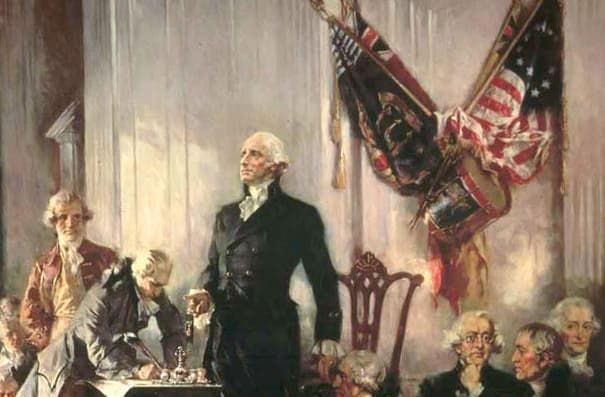Constitution Day: America’s Most Important Forgotten Holiday
Because the document has governed longer than any on earth, it’s easy to take for granted.

Today, Americans are commemorating the Constitution — at least, according to the federal calendar. Of 332 million-plus citizens living busy lives, few are actually pausing to salute the charter of liberties that enables their pursuit of happiness.
Because the document has governed longer than any on earth, it’s easy to take for granted. People don’t reflect on how it has endured any more than a baby bird wonders how it ended up in its nest.
Without reflecting on how our society got here, it’s harder to move forward, much less avoid sliding back into the tyranny and serfdom that was the norm before Americans put a match to the past on September 17, 1787.
That’s the day delegates to the Constitutional Convention signed the supreme law in Philadelphia and sent it to the states for ratification. Their vote was just short of unanimous, reflecting the hard work they’d done to iron out differences.
Soon after, Alexander Hamilton, James Madison, and John Jay joined forces to write The Federalist Papers, essays meant to persuade the several states that — if not “Join or Die,” as Benjamin Franklin’s political cartoon had urged during wartime — they should join or fail.
Delaware committed first. Pennsylvania, New Jersey, Georgia, and Connecticut followed within a month; then, ratification ran into trouble when Massachusetts balked.
“Some states,” the Constitution Center writes, “voiced opposition to the Constitution on the grounds that it did not provide protection for rights such as freedom of speech, religion, and press.”
The Massachusetts Compromise led to the addition of the Bill of Rights. Although Madison, the Father of the Constitution, opposed the idea as pointless, his fellow Americans nagged him into writing one.
“I was struck,” the author of “Madison’s Gift,” David O. Stewart, told me in an interview, “that Madison said a Bill of Rights would be ignored in times of crisis, which absolutely has been our pattern, and it’s not a great one.”
Today, we tend to think of those 10 amendments as equal to the Constitution, but for our first century — according to the author of “The Bill of Rights: A User’s Guide,” Linda Monk — they were applied only to the federal government, not states.
The Constitution itself, however, could not be ignored, because the states had signed onto it and enjoyed its benefits. So, at the Constitution’s centennial in 1887, it was time to celebrate.
America’s greatest challenge, the Civil War, was in living memory; the economy was struggling through “the Long Depression”; anarchists unleashed violence aimed at tearing up laws; and labor strikes were sometimes suppressed with force.
Yet Americans were confident that the Constitution would see them through; so, at its birthplace, President Cleveland kicked off a three-day party. “There were in line 300 floats,” the Sun reported on its front page, “each bearing a representation of some particular branch of industry, 12,000 men, 3,000 horses and 150 bands of music,” and “at least 200,000 visitors.”
At the 1987 bicentennial, President Reagan quoted Cleveland’s State of the Union address, remarking that his words were as true as they had been under, to quote the Sun, “a clear sky obscured here and there only by fleecy clouds” in the City of Brotherly Love.
“When we look down upon 100 years and see the origin of our Constitution,” Cleveland said, “when we contemplate all its trials and triumphs, when we realize how completely the principles upon which it is based have met every national need and national peril — how devoutly should we say with Franklin, ‘God governs in the affairs of men.’”
As the Constitution hits another milestone today, we are reminded again of its wisdom in enshrining the rights endowed to each individual and reminded of the words in Federalist 51, “If men were angels, no government would be necessary.”
We are not governed by angels in 2022 any more than we were in 1787, 1887, or 1987. Yet America remains, as President Lincoln called it, “the last, best hope of earth,” thanks to a Constitution as worthy of celebration on its 235th birthday as it was on its first.

